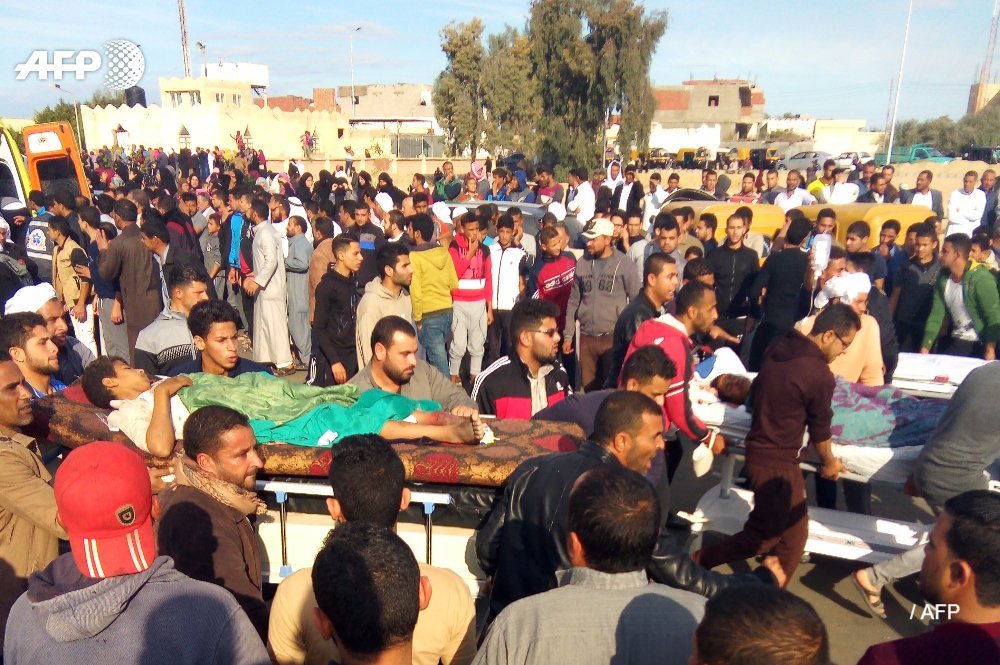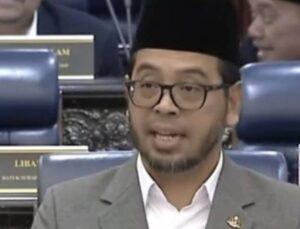Egypt’s President Abdel Fattah al-Sisi has vowed to respond forcefully after attackers killed at least 235 worshippers in a packed mosque in restive North Sinai province, the country’s deadliest attack in recent memory.
FULL #Egypt UPDATE: Attack on #mosque popular with #Sufis kills at least 235, according to state TV @AFP https://t.co/e9sJDwMndv #EgyptAttack pic.twitter.com/wrmw3ptiIF
— Jean-Marc Mojon (@mojobeirut) November 24, 2017
Al-Sisi declared three days of mourning would begin Saturday, the day after the gun and bomb assault on the Rawda mosque, roughly 40 kilometres (25 miles) west of the North Sinai capital of El-Arish.
In a televised speech the president pledged to “respond with brutal force”, adding that “the army and police will avenge our martyrs and return security and stability with force in the coming short period”.
Several hours later Egyptian air force jets destroyed vehicles used in the attack and “terrorist” locations where weapons and ammunition were stocked, an army spokesman said.
Witnesses said assailants had surrounded the mosque with all-terrain vehicles and detonated a bomb. They then mowed down panicked worshippers as they tried to flee and used congregants’ vehicles they had set alight to block routes to the mosque.
An attack on a mosque in restive North Sinai was Egypt’s deadliest in recent memory. Here are some of the country’s biggest attacks since the late 1990s: https://t.co/OHb4k0zefL pic.twitter.com/ugEY2wvdmY
— AFP news agency (@AFP) November 24, 2017
The state prosecutor’s office said in a statement that 235 people were killed and 109 wounded in the attack, the scale of which is unprecedented in a four-year insurgency by Islamist extremist groups.
AFP photographs of the scene indicated that children were among the dead.
World leaders condemned the attack. US President Donald Trump condemned on Twitter the “horrible and cowardly terrorist attack on innocent and defenceless worshippers”.
The grand imam of Cairo’s Al-Azhar, Sheikh Ahmed el-Tayeb, condemned “in the strongest terms this barbaric terrorist attack”.
IS targeting of Sufis
There was no immediate claim of responsibility for the bloodshed.
The Islamic State group’s Egypt branch has killed hundreds of policemen and soldiers, and also civilians accused of working with the authorities, in attacks in the north of the Sinai peninsula.
They have also targeted followers of the mystical Sufi branch of Sunni Islam as well as Christians.
A tribal leader and head of a Bedouin militia that fights IS told AFP that the mosque is known as a place where Sufis gather.
The Islamic State group shares the puritan Salafi view that Sufis are heretics for seeking the intercession of saints.
The jihadists had previously kidnapped and beheaded an elderly Sufi leader, accusing him of practising magic which Islam forbids, and abducted Sufi practitioners later released after “repenting”.
The group has killed more than 100 Christians in church bombings and shootings in Sinai and other parts of Egypt, forcing many to flee the peninsula.
The military has struggled to quell jihadists who pledged allegiance to IS in November 2014.

The jihadists have since increasingly turned to civilian targets, attacking not only Christians and Sufis but also Bedouin Sinai inhabitants accused of working with the army.
The Gaza Strip’s border crossing with Egypt that had been due to reopen Saturday will remain closed until further notice because of the attack, a Palestinian official said.
Aside from IS, Egypt also faces a threat from Al-Qaeda-aligned jihadists who operate out of neighbouring Libya.
A group calling itself Ansar al-Islam – Supporters of Islam in Arabic – claimed an October ambush in Egypt’s Western Desert that killed at least 16 policemen.
Many of those killed belonged to the interior ministry’s secretive National Security Service.
The military later conducted air strikes on the attackers, killing their leader Emad al-Din Abdel Hamid, a most wanted jihadist who was a military officer before joining an Al-Qaeda-affiliated group in Libya’s militant stronghold of Derna.

















